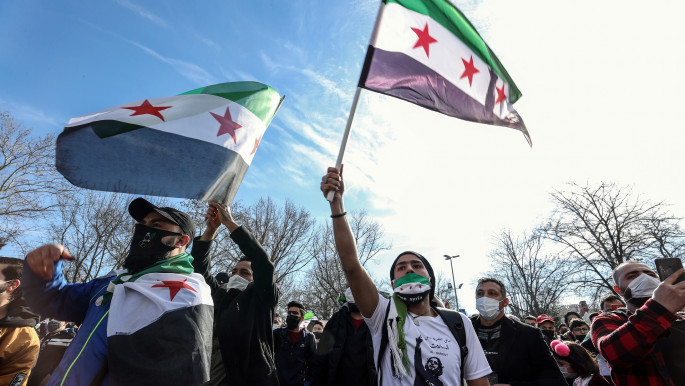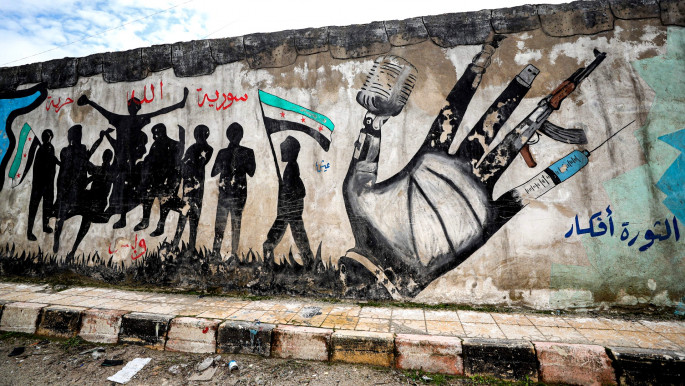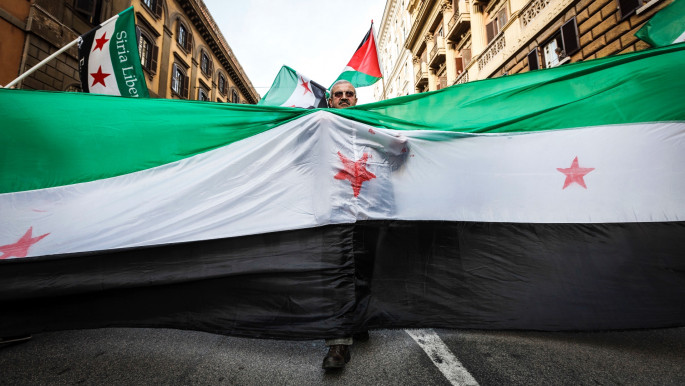Why Michel Kilo's death is a microcosm of the Syrian tragedy
Imprisoned, exiled, and sentenced to death in absentia under bogus terrorist charges, Kilo's fate mirrors that of many activists who defied the authoritarian regime of Syrian President Bashar al-Assad.
Kilo was born in 1940 to a Christian family in the Mediterranean coastal city of Latakia, the capital of the ancestral province of the Assad clan. A leading leftist intellectual who maintained close relations with Riad al-Turk, the founder of Syria's Communist Party (Political Bureau), Kilo organised in the 1980s against then-president Hafez al-Assad, Bashar's father, which led to his imprisonment.
In June 2000, Bashar inherited the presidency in the wake of the elder Assad's death. Sensing an opportunity to effect change, Kilo and three other prominent dissidents devised a petition calling on the regime to abolish martial law and establish a constitutional framework granting freedom of expression, assembly, and press, in addition to an end to mass surveillance and a pardon for political detainees, exiled citizens, and deportees.
Often referred to as "Statement 99," the initiative garnered the support of 99 signatories, namely intellectuals and activists, and sparked the "Damascus Spring," a short-lived era marked by the proliferation of public debate forums across the city centred on openly addressing political issues. Gatherings alluding to human rights and democracy, previously inconceivable in the informant-infiltrated streets of the capital, were brought to life, along with a renewed interest in civil society as an avenue for reforming Syrian politics.
 |
Kilo's unwavering commitment to a united and democratic polity made him an existential threat to a dynasty that has, since its inception, governed through co-option, coercion, and division |  |
The following January, Kilo spearheaded the "Manifesto of 1,000," once again named after the volume of signatures, the centrepiece of which was the demand that the regime terminate one-party rule and establish democratic electoral laws.
Though the Damascus Spring had hardly lasted six months before being crushed, Kilo and his colleagues set into motion a re-imagining of Syrian politics. The police state designed by Hafez had stubbornly persisted, yet the Spring, however brief, reinvigorated elements of the disjointed intellectual class by reminding them that they were not alone in their pursuit of democratic change.
 |
|
| Read more: Despite war and destruction, Syrian activists have no regrets on tenth anniversary of revolution |
In 2005, Kilo led efforts to assemble a broad coalition to openly express opposition to the Assad regime, culminating in the publication of the "Damascus Declaration." The bold rebuke openly characterised the regime as authoritarian and articulated the need for a national conference to coordinate the transition to democracy.
The initiative was signed and supported by representatives of numerous political factions, including Marxists, liberals, Kurdish nationalists, and exiled members of the Muslim Brotherhood.
In May 2006, a year after the killing of Lebanese Prime Minister Rafik al-Hariri and the withdrawal of Syrian troops from Lebanon, Kilo joined hundreds of Syrian and Lebanese intellectuals in signing the Damascus-Beirut Declaration, which conscientiously objected to the regime's continued meddling in the country's political affairs, beseeching Damascus to respect its sovereignty. As a result, he was jailed for three years, along with several others.
When the Arab Spring arrived in Syria in early 2011, it captured the imagination of multiple generations yearning for change. Naturally, Kilo supported the uprising, playing an active role in the nascent political opposition that had emerged amid the unfolding events.
 |
As a secular Christian, a leftist-nationalist-democrat, and an outspoken critic of foreign intervention, Kilo disrupted the regime's ability to frame all opposition to Assad's rule as violent Islamists or unpatriotic renegades |  |
Though the Assad regime sought to discredit the protest movement from the start, the largely peaceful cries for freedom, dignity, and national unity defied the discourse of deception being advanced by state media. The grassroots mushrooming of Local Coordination Committees across Syria further contradicted this rhetoric.
Initially focused on organising the delivery of humanitarian aid and documenting human rights violations, these pioneering revolutionary bodies helped facilitate the logistics of civil disobedience, such as the general strike of December 2011, prior to evolving into administrative structures that supported the establishment of self-governing zones of liberation.
In addition to demonstrating the power of mobilising civil society, they showcased to engaged observers the potential of participatory governance and the redundancy of Assad's despotic rule. This debunked the notion that the regime and its predatory surrogates were a prerequisite for upholding Syria's security and stability – a talking point relentlessly propagated by its mouthpieces on state television and regional media outlets.
Like many other organisers, Kilo's peaceful activism risked defusing minority fears of a resurgent and intolerant Sunni force, which were particularly acute among the Alawis – the same sect to which the president and upper echelons of the military-security complex belong.
 |
|
| Read more: In the shadows of Syria's revolution, a generation of activists is born |
As a secular Christian, a leftist-nationalist-democrat, and an outspoken critic of intercommunal reprisals and foreign intervention, Kilo's identity and platform disrupted the regime's ability to frame all opposition to Assad's mafia-style rule as violent Islamists bent on the extermination of religious minorities or as unpatriotic renegades advancing foreign interests.
Moreover, his prominence in organisations that enjoyed high cross-confessional membership, combined with his willingness to forge broad political coalitions, offered a vision for a society based on genuine inclusion. This unwavering commitment to a united and democratic polity risked alienating very few Syrians, and thus, made him and his likes an existential threat to a dynasty that has, since its inception, governed through co-option, coercion, and division. His political consciousness – one premised on democratic pluralism and civilian rule – made him an insufferable nuisance to an elite living off borrowed time.
Yet, by 2013 the country's pacifistic spring had mostly faded, overshadowed by a weaponised winter. The indignity and brutality ordinary Syrians faced at the hands of security apparatus and shabiha served as a catalyst for radicalisation, a self-fulfilling prophecy of which Assad and his henchmen were the main beneficiaries.
 |
Michel Kilo's prominence in organisations that enjoyed high cross-confessional membership, combined with his willingness to forge broad political coalitions, offered a vision for a society based on genuine inclusion |  |
Like many other moderate voices, Kilo was marginalised in favour of an increasingly vengeful and sectarian armed rebellion plagued by factionalism and operating at the directive of rival backers. His struggle against the militarisation and fragmentation of Syrian society prompted him to rebuke both the actions of the regime and that of the opposition.
When, for example, in May 2015 Jisr al-Shughour and Idlib city were captured by the Army of Conquest, an alliance of Islamist rebel factions, he decried the killing of an Alawite soldier strictly on a sectarian basis and the airing of an episode of a popular Al-Jazeera Arabic television show, hosted by Faisal al-Qassem, devoted to asking whether or not the community's so-called support for Assad warranted its genocide should the regime fall.
His principled rejection of criminality and sectarianism on all sides was accompanied by a sober repudiation of the opposition's dependence on foreign sponsors, which he rightfully asserted rendered Syrians "hostages to meticulous political and diplomatic games" by states seeking to advance their own foreign policy interests. He criticised the opposition's stagnation in light of its inability to break free from this reality.
 |
|
| Read more: Ten years on: Syria's revolution through the lens of the diaspora |
Kilo's consistent respect for humanity starkly contrasted with zealous figures like Zahran Alloush, the leader of the Army of Islam, and Hassan Aboud, the founder of Ahrar al-Sham, both of whom were released from prison by the mukhabarat alongside other known jihadists with the cynical aim of metastasising the uprising.
Kilo was an enduring symbol of hope in diametric opposition to the takfiri straw men-come-to-life of the Islamic State (IS) and Hayat Tahrir al-Sham, whose politics of repression and persecution embody the caricature of the opposition the regime desired – and indeed, worked so diligently to engineer.
Collectively, these actors distorted the aspirations of the Syrian street and hijacked its revolution.
Yet, in death Kilo is also a metaphor of the Syrian tragedy: another moderate neutralised, another victory for a regime that has all along sought to eradicate these voices and force Syrians to choose between a dichotomy of 'secular' and Islamist dictatorships. To be sure, the residual elements of the rebels that currently exist have largely been reduced to foreign-backed proxies and jihadist ideologues, a departure from the promise of 2011 and the original Free Syrian Army.
Today's Syria is a country in ruins. Death, displacement, and oppression – mostly at the hands of the regime and its backers – are compounded by rampant warlordism and poverty, ethnosectarian fracturing, and the unprecedented humiliation of the Syrian people.
Given the country's current state of affairs, those mourning Kilo's passing, on some level, are also lamenting the loss that has yet to come - the fear that his obituary potentially foreshadows that of the revolution.
Nizar Mohamad is an independent Middle East analyst based in Toronto, Canada, who focuses on Syrian and Levantine affairs. His work has appeared in TRT World, Mondoweiss, Atlantic Council, Newlines Institute for Strategy and Policy, and the Institute for Peace and Diplomacy. He previously worked on Canada's Syrian refugee project.
Follow him on Twitter: @NizarMohamad1




 Follow the Middle East's top stories in English at The New Arab on Google News
Follow the Middle East's top stories in English at The New Arab on Google News


